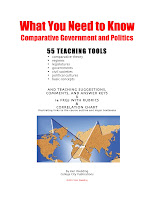What's a cleric?
In Iran, the religious leaders are supposed to be in charge. And they are. But, what is a cleric? It seems that most of them are busy running the country and its businesses. Jason Rezainan's analysis in The Washington Post seems insightful.Iranian election shows waning political influence of Shiite clerics
For most of its 34-year-old history, the Islamic Republic of Iran has been run by clerics serving not just as supreme leaders but also as elected presidents, their turban-clad figures becoming familiar worldwide as Iran’s public face.
But the theocratic order… has become increasingly divided, and the presidential election scheduled for Friday is revealing a dilution of its influence…
This year, divisions within some clerical groups — including the powerful Association of Combatant Clerics — delayed their endorsements. Some conservative candidates who would otherwise have counted on clerical blessings entered the presidential race without that backing, while one candidate who won a high-level clerical embrace backed out of the contest…
The reign of clerics in Iran’s presidency lasted 24 years, beginning with Ayatollah Ali Khamenei, who served two four-year terms beginning in 1981, and continuing with Ali Akbar Hashemi Rafsanjani, who served from 1989 to 1997, and Mohammad Khatami, who served from 1997 to 2005. But while most clergymen backed Rafsanjani in the 2005 presidential race, a split between the clerics and the popular vote emerged, leading to a runoff victory for Mahmoud Ahmadinejad, a former mayor of Tehran not eligible for either the black or white turban worn by his three predecessors.
Khamenei succeeded Ayatollah Ruhollah Khomeini in 1989 to become Iran’s supreme leader… But many top clerics have tried to stay out of the political fray, and the clergy’s role in Iranian society has evolved to the extent that clerics hold a wide range of jobs — particularly in the fields of education, law and trade — that have little do with their religious training…
Among politicians, the clerics who continue to enjoy considerable support do so more because of their political accomplishments than their religious ones…
Teaching Comparative blog entries are indexed.
The First Edition of What You Need to Know: Teaching Tools is now available from the publisher
The Fifth Edition of What You Need to Know is now available from the publisher.
Labels: elections, Iran, leadership, politics




0 Comments:
Post a Comment
<< Home